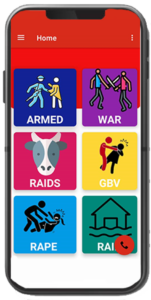Mapping the Way to Peace: Technology’s Role in Early Warning and Early Action for Conflict Prevention in South Sudan


In a world increasingly driven by digital innovation, in South Sudan, the “Alert Me” app is doing just that by providing real-time conflict early warnings to local authorities, enabling swift action to prevent violence. This blog post delves into how this innovative technology is transforming peace efforts in South Sudan, highlighting its impact, challenges, and future potential for revolutionizing early warning (EW) and early action (EA) for atrocity prevention. Early warning data are captured at the Boma level, Payam level, County level, State level, up to the National level in an effort to prevent atrocities, incidents, and violence in local communities.
Historically, conflict reporting in South Sudan involved cumbersome processes that delayed responses and often exacerbated violence. Reports had to be delivered to the capital, Juba, via written notes or word of mouth, leading to critical delays. The “Alert Me” application, operational since June 2021, has revolutionized this process by enabling real-time interaction between those reporting conflicts and responders. “Alert Me” is a home-grown mobile application developed with funding from the United Nations Development Program (UNDP) to provide a method for grassroots data collection within the Conflict Early Warning and Response Unit at the South Sudan Peace and Reconciliation Commission. This mobile innovation allows for immediate action, particularly at the county level where commissioners can swiftly address alerts.
Modern technology offers sharper tools for EWEA, vastly improving atrocity prevention. Spatial technology, such as GPS and location-enabled mobile apps, enhances data collection and analysis. The “Alert Me” app in South Sudan is a prime example, allowing users to report incidents via SMS, audio, or video. This data, automatically shared with authorities, enables quick responses, especially at local levels where immediate action is crucial. Crowdsourcing also plays a vital role, gathering real-time data from various sources to improve visualization and understanding of conflict dynamics.
One of the most significant impacts of the “Alert Me” app is the empowerment of local communities. By providing key data on conflicts, the app enables local solutions to local problems, reducing reliance on the central government for intervention. This has fostered a sense of ownership among local peace committees and enhanced the sustainability of peace efforts.
In South Sudan, the “Alert Me” app has been pivotal in reducing violence. For instance, in Lakes State, real-time reports of cattle raiding allowed local authorities to intervene quickly, preventing escalation. Similarly, the app helped monitor the movement of pastoral communities, averting conflicts with farmers in Eastern and Central Equatoria.
Spatial technology and mobile apps hold immense potential for enhancing EWEA. While the Alert Me application has been key to rapid, community-empowering data collection, the integration of these data into more sophisticated frameworks should be explored. However, this work shows that successful integration of technology within early-warning systems requires collaboration among technologists, EWEA professionals, and policymakers. Together, we can develop and responsibly use technology to prevent atrocities and build a more peaceful world.
Wani Geoffrey Milla is an early warning consultant, Team Lead at Open-South Sudan, and developer of the “Alert Me” mobile application